LE POUVOIR DES ACTES DE DISCOURS
THE POWER OF SPEECH ACTS
Author(s): Gilles GauthierSubject(s): Language and Literature Studies, Politics and communication, Theory of Communication, Philology
Published by: Editura Alma Mater
Keywords: speech acts; illocutionary power; perlocutionary power; illocutionary acts; conditions of satisfaction;
Summary/Abstract: Discursive power is apprehended from the definition of institutional power given in John Searle's theory of the construction of social reality on the basis of the deontic apparatus developed in his theory of rationality in action. A distinction is made between two types of discursive powers: illocutionary power and perlocutionary power. The analysis of these two types of powers is carried out according to the Searlean classification of illocutionary acts and the categorization of their conditions of accomplishment. The two main generative factors of discursive power are then highlighted: the speaker's status of authority or of some other ascendancy and his capacity to perform an action, as well as the necessary reaction of the addressee to a condition of accomplishment of the illocutionary acts. The analysis finally leads to a general framework for the exercise of discursive power according to three fundamental features: discursive power is localized, it is organized in a structured illocutionary power and in a conditional perlocutionary power.
- Issue Year: 2022
- Issue No: 33
- Page Range: 13-27
- Page Count: 15
- Language: French
- Content File-PDF

